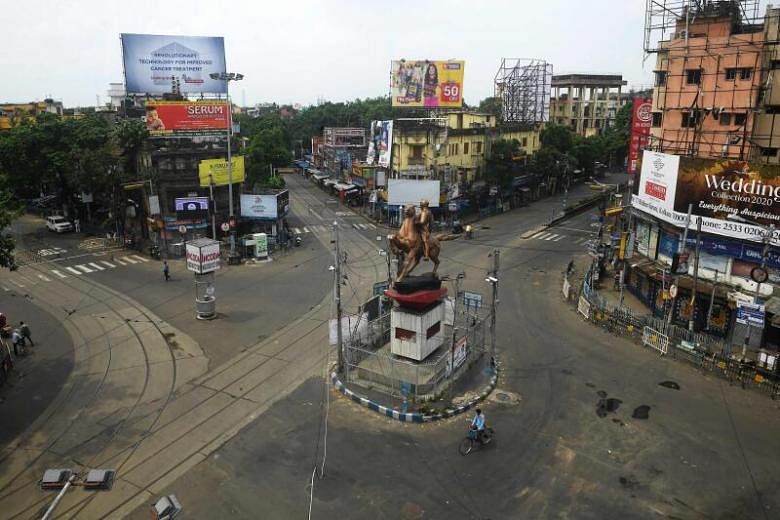NEW DELHI - The Indian economy, which contracted by 23.9 per cent in the first quarter this year on the back of a stringent lockdown that led to job losses and drove down consumption, is in even bigger trouble, latest growth figures showed.
Analysts say a fresh stimulus package is much needed to push growth in the Indian economy, once the fastest growing in the world.
On Monday (Aug 31), government data revealed that the Indian economy is performing at its worst since 1996, when the country first started publishing quarterly gross domestic product (GDP) figures.
Additional data for the first quarter ended June 30 revealed that manufacturing had contracted by 39 per cent, construction by 50.3 per cent and trade, hotel, transport and communication segments by 47 per cent.
A rare positive - agriculture, forestry and fishing, which inched up 0.4 per cent to 3.4 per cent.
According to credit ratings agency CARE Ratings, India is behind only Peru and Macau in having the severest contraction out of the 54 economies that reported GDP figures for April to June.
The prediction by analysts is that India, once seen as a global economic driver, would continue to lag behind other economies.
"High frequency data suggests a pick-up in mobility in August after a stagnation in June to July, whilst still lagging most regional peers," said DBS Bank economist Radhika Rao.
"Consumption weakness in the current cycle stems from weaker disposable incomes and uncertainty over employment prospects, rather than changes in the rate cycle.
"This requires a larger fiscal push, which carries a greater multiplier for growth but meets a constrained headroom due to anaemic revenue collections."
She predicts a stimulus push later in the year which may include "short-term boost for consumption, including cash transfers and a "medium-term push towards investments".
India was already facing headwinds with a slowing economy and jobless growth even before the coronavirus pandemic derailed the economy.
Growth had touched a six year low of 4.7 per cent in the final quarter of 2019.
In March, the federal government imposed a stringent countrywide lockdown, bringing economic activity to a complete halt.
Hundreds of migrant workers lost their jobs, demand dropped and businesses and industry were shut. It has since eased the lockdown in stages with metros being allowed to resume operations in the latest loosening of restriction.
The government had in March also announced a 1.7 trillion rupee ($31.7 billion) financial package, involving direct cash transfers and free food, and in May introduced a 20 trillion rupee economic package, including collateral-free loans for small businesses.
But there has been little impact on consumption.
Resumption of economic activity has been hit as state governments continue to implement mini lockdowns including night curfews and weekend shutdowns to curb infections within their borders.
The federal government, keen to push economic growth, has said state governments cannot impose lockdowns without federal consent even as India remains among the three worst hit countries with 3.77 million cases.
Still, government officials remain optimistic that there would be a turnaround in the upcoming financial quarters.
Chief economic adviser to the Indian government Krishnamurthy Subramanian said the country is seeing "V-shaped recovery", in which the economy goes through a brief period of economic decline followed by a strong recovery.
"India was in a lockdown all through April to June quarter with the majority of economic activities being restricted. So this trend is along expected lines," he said in a statement on the slowing growth.
The coronavirus pandemic has impacted unemployment, particularly among young workers.
A majority - 52 per cent - of urban workers in India went at least a month without work, pay or any financial assistance during the lockdown, according to a report entitled "City of Dreams no more", published on Tuesday by the London School of Economics' (LSE) Centre for Economic Performance.
Workers in cities between 18 and 25 years old were already less likely to be in formal jobs and more likely to be employed informally and paid less, wrote Ms Shania Bhalotia, Ms Swati Dhingra and Ms Fjolla Kondirolli, the authors of the LSE report.
The slowing economy has also led to concerns that gains made in the past two decades to bring the poor out of poverty could be severely hit.
The World Bank said the pandemic is pushing millions of Indians into poverty, with half of India's population vulnerable due to income and job losses from the pandemic.
Professor Biswajit Dhar of Jawaharlal Nehru University said all the growth drivers that are necessary for any kind of recovery in the ensuing quarters seem to be missing.
"You don't have customer demand and then you don't have investment, which is falling, and then exports are depressed obviously because of the global situation," he said.
"All these problems of lockdown, it adds on to the structural problems. The whole problem is you don't have basic enabling environment with poor infrastructure and red tape."
And many believe that until India gets the pandemic under control, economic recovery would remain problematic.
"The increase in the number of coronavirus cases in the country has delayed the chances of an early economic recovery," said Mr Rishi Sahai, managing director and co-founder of corporate finance firm Cogence Advisors.
India last week reported the most new Covid-19 cases of any country, the World Health Organisation said.
The country reported 500,000 new cases, a 9 per cent increase compared to the previous week.


